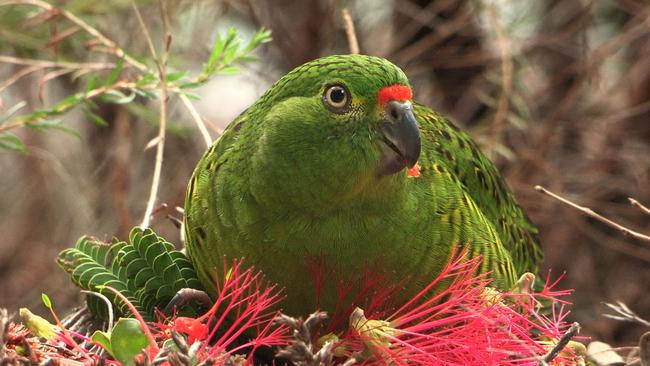Bushfires: Desperate battle to save western ground parrot
Conservationists are battling to save a species of parrot that faces extinction after the bushfires.

Conservationist Paul Wettin says he tried to tell former environment minister Melissa Price in a meeting last year that the western ground parrot’s survival after catastrophic fires depended on finding $3m for a recovery plan.
He also met twice with the Threatened Species Commissioner Sally Box, but only $110,000 from the National Landcare Fund has resulted.
“What’s come out is a lot of sympathy and not much direct action,” Mr Wettin said.
Yet his grassroots community group, Friends of the Western Ground Parrot, has spent hundreds of volunteer hours raising almost as much money, with film night events and donations reaching $65,000 in the past two years.
With $1m from the West Australian government, the money has helped pay for expensive monitoring devices that pick up the sunset call of the squat, ground-breeding parrot that is estimated to number fewer than 150 individuals in the wild.
Federal Environment Minister Sussan Ley met environmental groups on Wednesday to discuss a $50m fund for protecting Australia’s native species threatened by this season’s catastrophic bushfires. Ms Ley, who mentioned the ground parrot as among the nation’s most vulnerable birds, said citizen scientists could help with species recovery.
Mr Wettin had a blunt message for the minister. “Meet your responsibilities,” he said. “This parrot is a critically endangered species and given the fires of the last four years, it could go extinct on your watch.”
Three devastating wildfires since 2015 have scorched vast areas of the birds’ chosen scrubby habitat on Western Australia’s remote southern coast.
The latest fire on December 20 was caused by lightning, sparking blazes that swept through Cape Arid National Park and nearby Nuytsland Nature Reserve. It razed close to 40,000ha, including crucial ground parrot habitat.
“We have lobbied for emergency feral predator control to be carried out immediately to protect the surviving birds, as feral cats are known to concentrate their hunting into unburnt habitat following fires,” Mr Wettin said.
Moving some bird populations into less fire-affected areas might be the only salvation, he said.
“A translocation strategy for the species is needed, so you don’t have all your eggs in one basket,” Mr Wettin said.
This would cost $350,000 over two years, “and that part of the recovery plan is still unfunded”.
Meanwhile, the friends group said it was already doing all it could to keep ground parrots in the landscape. It had donated tens of thousands of dollars to buy 10 solar-powered recording units and have them installed by helicopter.
“We’re now raising additional funds to buy 10 units needed to survey the remote areas,” Mr Wettin said. “But our donations are not solving the whole problem.”



To join the conversation, please log in. Don't have an account? Register
Join the conversation, you are commenting as Logout